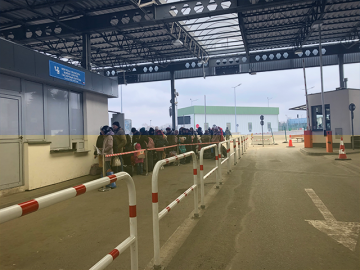“I warmly welcome the heartfelt solidarity shown across Europe towards the people escaping the conflict in Ukraine,” said FRA Director Michael O’Flaherty. “But there are grounds for immediate concern which urgently need addressing, such as allegations of discrimination and racism, and the danger of trafficking. In addition, EU countries need to start now planning ahead for the needs of millions of people who may no longer have a home to return to.”
FRA’s short report ‘EU-Ukrainian border check points: First field observations’ summarises observations from FRA staff at the Hungarian, Polish, Romanian and Slovak borders with Ukraine and Moldova. It highlights:
- Overwhelming support – FRA witnessed tremendous solidarity towards the people fleeing from Ukraine. People were not only accepted into the EU, but officials and volunteers assisted them with kindness. Looking ahead, EU civil protection mechanisms should support authorities in providing assistance and simplifying administrative red tape.
- Discrimination and racism – even though FRA did not observe any discriminatory or racist acts during its field visits, the Agency is aware of the many allegations of racism as reported in the media. These should be promptly investigated. Authorities should be diligent to prevent such acts and civil society should be encouraged to report incidents.
- High danger of human trafficking – FRA observed individuals offering transportation, work and accommodation. The Agency advised relevant authorities to make additional efforts to inform in simple and considered language about the risks of trafficking. People should be warned also orally during passport controls and advised not to accept non authorised rides or accommodation. To avoid the risk of trafficking, all unaccompanied children should be immediately placed into protective care.
- Education – in some countries, children were immediately placed in classes of local schools. Such initiatives should be continued and replicated. Looking ahead, there will also be a need for language learning so that children can continue their education.
- Volunteers – in some locations, humanitarian aid, legal assistance or translations rely heavily on volunteers and local communities. A sustainable long-term solution is necessary to support volunteers and improve cooperation at all levels.
While most people fleeing the conflict want to go back to their home country as soon as possible, this may not be possible and their stay in the EU may become much longer.
EU countries should therefore start planning ahead. This will require extensive relocations across the EU, as well as integration measures and policies at EU, national and local levels. These will need to consider:
- the impact of psychological trauma;
- the particular challenges facing the overwhelming majority of arrivals who are women, many with infants or young children, in accessing employment and finding childcare;
- family reunification;
- the specific needs of children;
- prevention and monitoring to avoid labour exploitation.
During the field visits to all EU countries bordering Ukraine and Moldova, FRA observed how these countries address fundamental rights challenges during this humanitarian crisis. This allows FRA to calibrate its advice to EU institutions and Member States.
FRA stands ready to support Member States in their efforts to fully respect and protect fundamental rights.
